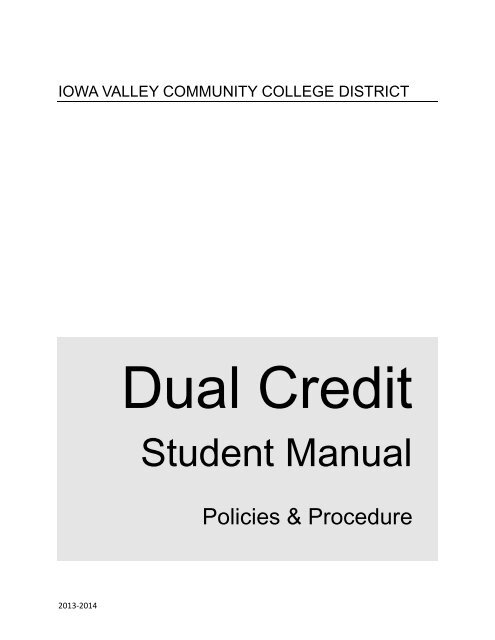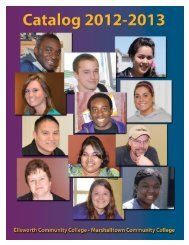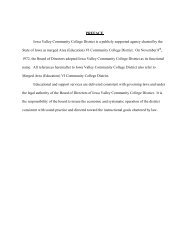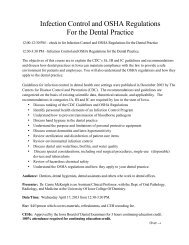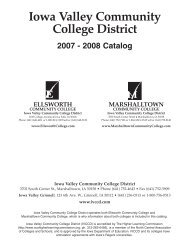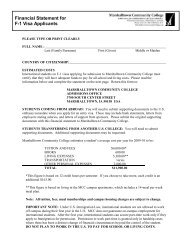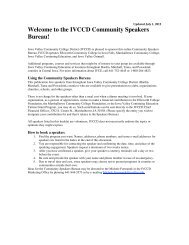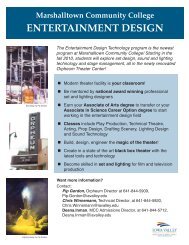Dual Credit Manual - Iowa Valley Community College District
Dual Credit Manual - Iowa Valley Community College District
Dual Credit Manual - Iowa Valley Community College District
You also want an ePaper? Increase the reach of your titles
YUMPU automatically turns print PDFs into web optimized ePapers that Google loves.
IOWA VALLEY COMMUNITY COLLEGE DISTRICT<br />
<strong>Dual</strong> <strong>Credit</strong><br />
Student <strong>Manual</strong><br />
Policies & Procedure<br />
2013-2014
Table of Contents<br />
Introduction .................................................................................................................................................. 2<br />
<strong>Dual</strong> <strong>Credit</strong>: Earn <strong>College</strong> <strong>Credit</strong> While in High School ................................................................................. 2<br />
<strong>Dual</strong> <strong>Credit</strong> Options ....................................................................................................................................... 3<br />
1. CONCURRENT COURSES .................................................................................................................... 3<br />
Concurrent Enrollment Program (CEP) ................................................................................................. 3<br />
Online Courses ...................................................................................................................................... 3<br />
Career Academy .................................................................................................................................... 4<br />
2. PSEO COURSES .................................................................................................................................. 5<br />
3. CLEP (COLLEGE-LEVEL EXAMINATION PROGRAM) CREDIT ............................................................... 5<br />
4. AP (ADVANCED PLACEMENT) CREDIT ............................................................................................... 6<br />
<strong>Dual</strong> <strong>Credit</strong> Registration Process ................................................................................................................... 7<br />
Frequently Asked Questions* ....................................................................................................................... 9<br />
Campus Resources ...................................................................................................................................... 11<br />
ECC Campus Map ........................................................................................... Error! Bookmark not defined.<br />
MCC Campus Map .......................................................................................... Error! Bookmark not defined.<br />
2013-2014 1
Introduction<br />
Welcome to <strong>Iowa</strong> <strong>Valley</strong> <strong>Community</strong> <strong>College</strong>! The purpose of this manual is to<br />
familiarize you with the policies and procedures at IVCCD. The idea for this manual came<br />
from previous dual credit students and their suggestions to improve the process and our<br />
communication with you. We recognize that for some of you this is your first dual credit<br />
course, while others may have previous experience. We hope this manual will serve as a<br />
reference, providing helpful information to make your experience at IVCCD very positive.<br />
We encourage you to particularly focus on the FAQs and Campus Resources sections.<br />
Many of your questions may be answered there but, if not, please be sure to seek out the<br />
answers you need. Your success is our goal!<br />
<strong>Dual</strong> <strong>Credit</strong>: Earn <strong>College</strong> <strong>Credit</strong> While in High School<br />
Students may earn college credit while in high school, saving the cost of tuition and saving<br />
time by getting ahead in college credits. The classes are FREE to students - the high school<br />
pays the tuition and fees. Taking college classes while in high school allows students to<br />
explore an academic or career field, as well as, get an idea of what college coursework<br />
entails.<br />
Planning ahead as a high school freshman, will allow the optimum scheduling options. In<br />
some cases students can earn up to a full year or more of college credit while in high<br />
school, allowing them to enter college as a sophomore!<br />
Generally if a student has taken all available, related coursework the high school will allow<br />
him/her to enroll in a dual credit course. Also a high school will often approve a college<br />
course not offered by the high school.<br />
There are four ways students may earn college credit: Concurrent, PSEO (Post-Secondary<br />
Enrollment Option), CLEP (<strong>College</strong>-Level Examination Program), and AP (Advanced<br />
Placement). To earn college credit while still in high school, contact your high school<br />
guidance counselor for more information and enrollment forms. You may also contact MCC:<br />
Connie Gardalen, Coordinator of High School Relations via phone at (641) 844-5740 or via<br />
email at Connie.Gardalen@iavalley.edu or ECC: Barb Klein, Dean of Enrollment Services<br />
via phone at (641) 648-8518 or via email at Barb.Klein@iavalley.edu.<br />
2013-2014 2
<strong>Dual</strong> <strong>Credit</strong> Options<br />
1. CONCURRENT COURSES<br />
Concurrent Enrollment Program (CEP)<br />
Definition – CEP courses are located at the high school and are taught by qualified high<br />
school instructors (CEP Adjuncts). Course opportunities are available when enough high<br />
school students enroll to constitute a class.<br />
<strong>Dual</strong> credit - Students earn both college credit and high school credit.<br />
Cost - The high school pays the tuition and fees per course. The textbook policy varies by<br />
high school.<br />
Reminder: Your effort to withdraw early, if necessary, is greatly appreciated by both<br />
your high school and the college.<br />
Class Schedule - Check with your guidance counselor for a list of classes available at your<br />
high school.<br />
Course Enrollment - If interested contact your high school guidance counselor to enroll.<br />
You will submit the High School Student Application/Registration form to the MCC or ECC<br />
Admissions Office. Some courses do have a cut score requirement (see <strong>Dual</strong> <strong>Credit</strong><br />
Registration Process).<br />
Books – Textbook(s) are the property of your high school and will be provided by your<br />
course instructor.<br />
Online Courses<br />
Definition – Online courses are accessed through the ANGEL/Online Learning System.<br />
<strong>Dual</strong> credit - Students earn both college credit and high school credit.<br />
Cost - The high school pays the tuition and fees per course. The textbook policy varies by<br />
high school.<br />
Reminder: Your effort to withdraw early, if necessary, is greatly appreciated by both<br />
your high school and the college.<br />
Class Schedule - Check with your high school guidance counselor to request a list of<br />
approved online course options. Common courses include: Introduction to Psychology,<br />
Personal Wellness, Art Appreciation, and Human Growth & Development.<br />
Course Enrollment - If interested contact your high school guidance counselor to enroll.<br />
You will submit the High School Student Application/Registration form to the MCC or ECC<br />
Admissions Office. Some courses do have a cut score requirement (see <strong>Dual</strong> <strong>Credit</strong><br />
Registration Process).<br />
Books - The required course textbook(s) will be available at your high school guidance<br />
office. Whether you finish the course or not, all materials must be returned to your high<br />
school guidance counselor. Book(s) must be returned, in good condition, to the college by<br />
the end of Final Exam week, or you will be billed for the full amount of the book(s).<br />
2013-2014 3
Career Academy<br />
Definition - High school students enroll in college courses within the career and technical<br />
field. Career Academies are beneficial to students who are interested in the vocational field<br />
and want to begin college coursework while in high school. Courses are offered in one or<br />
two hour blocks of time. Current fields of study offered include:<br />
Ellsworth location:<br />
• Agriculture/Swine Management<br />
• Biotechnology<br />
• Business and Information Technology<br />
• Health Occupations<br />
Marshalltown location:<br />
• Broadcasting/Mass Media Studies<br />
• Business Administration<br />
• Computer Network Management<br />
• Construction Technology<br />
• Early Childhood Education<br />
• Entertainment Design Technology<br />
• Health Occupations<br />
• Tool and Die<br />
• Welding<br />
Grinnell location:<br />
• Ag Business<br />
• Animal Science<br />
• Automotive Technology<br />
• Broadcasting/Mass Media Studies<br />
• Business Administration<br />
• Criminal Justice<br />
• Entrepreneurship<br />
• Health Occupations<br />
• Industrial Maintenance<br />
<strong>Dual</strong> <strong>Credit</strong> - Students earn both college credit and high school credit.<br />
Cost - The high school pays the tuition and fees per course. The textbook policy varies by<br />
high school.<br />
Reminder: Your effort to withdraw early, if necessary, is greatly appreciated by both<br />
your high school and the college.<br />
Class Schedule - Check with your high school guidance counselor for a brochure with a list<br />
of specific classes and a timeline of when they are offered.<br />
Course Enrollment - If interested contact your high school guidance counselor to enroll.<br />
You will submit the High School Student Application/Registration form to the MCC or ECC<br />
2013-2014 4
Admissions Office. Some courses do have a cut score requirement (see <strong>Dual</strong> <strong>Credit</strong><br />
Registration Process).<br />
Books – The required course textbook(s) will be available at your high school guidance<br />
office. The books for career academy courses are the property of your school district and<br />
should be returned at the end of the class.<br />
2. PSEO COURSES<br />
Definition – PSEO courses are located at the <strong>College</strong> location.<br />
<strong>Dual</strong> <strong>Credit</strong> - Students earn both college credit and high school credit.<br />
Cost - The high school pays the tuition, fees, and textbook costs up to $250 per student per<br />
class.<br />
Reminder: Your high school pays up to $250 per course towards tuition and books. Most of<br />
the time, the course and books exceed this amount and the additional cost is absorbed<br />
by MCC. Therefore, your efforts to find used books and withdraw early, if necessary, are<br />
greatly appreciated by both your high school and the college.<br />
Class Schedule - Check with your high school guidance counselor to request a list of<br />
approved PSEO classes.<br />
Course Enrollment – If interested contact your high school guidance counselor to enroll.<br />
You will submit the High School Student Application/Registration form to the MCC or<br />
ECC Admissions Office. Some courses do have a cut score requirement (see <strong>Dual</strong><br />
<strong>Credit</strong> Registration Process).<br />
Books - The required course textbook(s) will be available at your high school guidance<br />
office. Whether you finish the course or not, all materials must be returned to your high<br />
school guidance counselor. Book(s) must be returned to the <strong>College</strong> by the end of Final<br />
Exam week, or you will be billed for the full amount of the book(s).<br />
3. CLEP (COLLEGE-LEVEL EXAMINATION PROGRAM) CREDIT<br />
Definition- CLEP Tests are designed to provide able students an opportunity to secure<br />
college credit through testing. Through this program, students are able to shorten the time<br />
required to earn a degree, lighten the academic load, and receive credit for previously<br />
attained knowledge and save money.<br />
<strong>Credit</strong> - IVCCD administers the CLEP exam. Students, who receive a qualifying score, earn<br />
college credit. A student who is very proficient within an academic area, for example<br />
Spanish, should consider the CLEP.<br />
Cost -CLEP Fee is $80 (New Fee as of July 1, 2012) (This fee is paid directly to CLEP).<br />
MCC Test Administration Fee is $45 (Paid to Marshalltown <strong>Community</strong> <strong>College</strong>)<br />
(These 2 fees must be paid at the time of testing, by credit card or check. CLEP<br />
does not permit testing without payment prior to testing.)<br />
Additionally, for students who want to apply CLEP credit to their MCC transcript, the<br />
charge is $15.00 per credit hour payable to MCC. IMPORTANT NOTE: The “Test<br />
Administration Fee” will also help to cover the credit fee. For example, if you are<br />
2013-2014 5
taking a CLEP Test worth “3 credits” at MCC, then the $45 Test Administration Fee<br />
will cover the entire credit hour fee. (Most CLEP Tests are worth 3 credits. The<br />
main exceptions are the foreign language tests which are worth up to 12 credits.) If<br />
you take a foreign language CLEP test and earn 12 credits, then the credit fee would<br />
be: 12 credits x $15 = $180 - $45 Test Admin. Fee = $135 <strong>Credit</strong> Fee.<br />
CLEP Exams - Contact Daniel.Key@iavalley.edu for more test options.<br />
4. AP (ADVANCED PLACEMENT) CREDIT<br />
Definition – Designed for high school students who have demonstrated competence by<br />
achieving at a high level in college preparatory courses. AP courses provide an in-depth<br />
study that is accelerated above and beyond the work typically done in “regular” high school<br />
courses.<br />
<strong>Credit</strong> –To receive MCC college credit, students must pass an Advanced Placement test<br />
after completing the course. The tests are administered at the high school, with results<br />
forwarded to one or more colleges as selected by the student. Depending on the test score,<br />
a student may or may not receive college credit for the AP course.<br />
Cost - The student must pay for the cost of the AP exam, administered at the high school.<br />
AP Classes Schedule – Contact your high school. Course options vary but typically include<br />
AP Psychology and AP Economics.<br />
Course Enrollment - Since the classes are a part of the regular high school curriculum,<br />
students must register during their regular high school registration. Contact your high school<br />
guidance counselor for more information.<br />
2013-2014 6
<strong>Dual</strong> <strong>Credit</strong> Registration Process<br />
Senior Year Plus: Student Eligibility Criteria<br />
Students planning to enroll in career and technical education (CTE) courses delivered<br />
via concurrent enrollment are now exempt from <strong>Iowa</strong> Code section 261E.3(1)e – the<br />
requirement that students demonstrate proficiency on the <strong>Iowa</strong> Assessments in reading,<br />
math, and science. With the passage of the bill, students do not need to demonstrate<br />
proficiency in reading, math, and science to concurrently enroll in career and technical<br />
courses, but they must continue to demonstrate proficiency to be eligible to enroll in<br />
other concurrent enrollment courses. All students must continue to meet any<br />
expectations set by the community college (e.g., placement exam cut scores,<br />
prerequisites) to be eligible for concurrent enrollment or postsecondary enrollment<br />
option (PSEO). Additionally, to be eligible to enroll in CTE courses via PSEO, students<br />
must meet the reading, math, and science proficiency requirement.<br />
REGISTRATION PROCESS FOR IVCCD COURSES<br />
Once a student has met the state proficiency requirements, the high school counselor will<br />
submit the High School Student Application/Registration form to the ECC or MCC<br />
Admission’s Office. Certain courses, such as math and English, have test score<br />
requirements/prerequisites. ACT, COMPASS, or PLAN scores are accepted to meet those<br />
requirements.<br />
Prior to the term, dual credit students receive a dual credit letter to confirm their registration<br />
and policies/procedures. The high school counselor receives multiple lists to confirm<br />
ongoing dual credit registrations.<br />
IVCCD TEST SCORE REQUIREMENT PROCESS<br />
1. Submit test scores required for desired course. For example, a student who wants to<br />
register for English Composition 1 needs to achieve a minimum writing score on one<br />
of the following assessments: 60 COMPASS, 18 ACT, or 15 PLAN (see chart on next<br />
page).<br />
2. If Admissions does not have a student’s test scores on file, the registration form will<br />
not be processed until those scores have been received. The high school guidance<br />
office needs to send the scores to Admissions or, if the student has not tested,<br />
schedule to take necessary portions of the COMPASS at the <strong>College</strong>.<br />
3. If the student does not meet the minimum standards for ACT or PLAN scores, they<br />
can re-test with the COMPASS test. If scores are still not met on the COMPASS test,<br />
there is a challenge test in place for most classes. In rare situations, at the point<br />
where the student does not meet the challenge test requirements; the counselor may<br />
submit an Acceptance of Responsibility in Regard to Academic Course Placement<br />
Form to the Registrar with reasoning why the student should be able to take the<br />
course.<br />
2013-2014 7
2013-2014 8
Frequently Asked Questions*<br />
*Please also view the <strong>District</strong> dual credit website at www.<strong>Iowa</strong><strong>Valley</strong>StepItUp.com<br />
1. What services are available to me?<br />
As a high school student you have access to all campus resources and student<br />
services, including athletics and student activities. See the Resources section for<br />
more detailed information.<br />
2. How do I obtain my course textbook(s)?<br />
Course textbooks will be available at your high school guidance office and are the<br />
property of the college, or your school district. Textbooks must be returned, in<br />
good condition, to your high school guidance office by the end of Final Exam<br />
week or you will be billed for the full amount of the book(s).<br />
3. How do I contact my instructor?<br />
Each instructor is available to answer student questions. They will often provide<br />
office hours in a course syllabus or post them on their office door. E-mail is also an<br />
effective communication method.<br />
4. What about transportation to the college?<br />
Students are responsible, unless the high school has other arrangements.<br />
5. How do I check my grades?<br />
To access grades, go to the district website www.iavalley.edu and click on “Paw<br />
Pass Login”. Enter your ID number (ID number is located on student photo ID card)<br />
and the Password is your date of birth (8-digit format without spaces or dashes).<br />
Click “login” and then select the “Student” tab. Be sure to “logout” when finished.<br />
More information about your <strong>Iowa</strong> <strong>Valley</strong> Online account is available in the resources<br />
section.<br />
6. Is my grade permanent?<br />
Yes! It is very important to remember that these classes are dual credit: students<br />
receive high school and college credit. You are starting/adding to a college<br />
transcript. Take each class seriously, remembering that your grade(s) will be<br />
permanently recorded on an official college transcript that follows throughout<br />
your college endeavors.<br />
7. Do you offer Internet classes?<br />
Internet classes are available as a course option for Concurrent students.<br />
8. May high school freshmen and sophomores take college credit classes?<br />
Yes, in some cases, but permission is needed from the high school. All dual credit<br />
registrations must be processed through the high school guidance counselor.<br />
9. Is there a limit to the number of credits I may earn in one year?<br />
Yes. According to Senior Year Plus legislation, a school district cannot pay for a high<br />
school student to be enrolled in college credits on a full-time basis. Full-time status is<br />
defined as a student who completes 24 credits or more between fall and spring<br />
semesters (combination of Concurrent and PSEO courses). The college will work<br />
with students, however, to bill them for additional courses that put them beyond 23<br />
credits.<br />
10. What about summer classes?<br />
Summer classes are available to high school students. Students are responsible for<br />
2013-2014 9
all costs during the summer terms. Submit the High School Student<br />
Application/Registration form and indicate “Self-pay” as the Type of Class.<br />
11. What if I need to withdraw from a course?<br />
To make changes to the class schedule, students must submit an Add/Drop Form to<br />
the Registrar’s Office. The Registrar’s Office will also accept a drop request email<br />
from the guidance counselor. Students who simply stop attending classes and do not<br />
officially withdraw are still enrolled for the course. If withdrawal is necessary, try to<br />
do so early in the semester so that your school may be eligible for a partial tuition<br />
refund. You will follow your school procedures and may need to reimburse your high<br />
school for the remaining amount of tuition not refunded by IVCCD.<br />
12. What if a student drops or fails a class?<br />
Each student must follow the individual procedures of his/her school.<br />
13. How do I transfer credits to colleges other than ECC, MCC, or<br />
<strong>Iowa</strong> <strong>Valley</strong> Grinnell?<br />
Students must complete a transcript request form and submit it to the MCC or ECC<br />
Registrar’s Office. There is a $5 minimal processing fee for transcripts. The high<br />
school does not pay this fee. Access www.TransferIn<strong>Iowa</strong>.org to learn how IVCCD<br />
credit will apply toward a degree at <strong>Iowa</strong> State University, the University of <strong>Iowa</strong>, or<br />
the University of Northern <strong>Iowa</strong> they should check the university’s website for<br />
information on transferring credit.<br />
For vocational credits, such as those awarded for participating in the Career<br />
Academies, a total of 16 credits can be transferred as electives to <strong>Iowa</strong> State<br />
University, the University of <strong>Iowa</strong>, or the University of Northern <strong>Iowa</strong>.<br />
14. What if I want to continue full-time after graduation as an ECC or MCC<br />
student?<br />
We hope you’ll choose to continue your education with us! Each student must<br />
complete the admissions process in order to be accepted after high school. The<br />
three requirements include:<br />
a. Complete an Application for Admission<br />
b. Send official high school transcripts<br />
c. Submit ACT or Compass test scores<br />
15. Where do I access the Catalog or Student Handbook?<br />
Both resources are available online, through the dual credit website, at<br />
www.<strong>Iowa</strong><strong>Valley</strong>StepItUp.com.<br />
2013-2014 10
Campus Resources<br />
As a dual credit high school student, you have access to all campus resources and student<br />
services. <strong>Dual</strong> credit students receive the same services as all other college students.<br />
Student ID card<br />
Obtain your Student ID at the ECC or MCC Library. The ID card has your student ID<br />
number and allows access to many resources, including library check-out, athletic and<br />
student events, etc.<br />
PawPass Login<br />
The PawPass portal houses a list of frequently used links. To access go to<br />
www.iavalley.edu and click on, “PawPass.” As a dual credit student, you’ll find the<br />
following four PawPass links to be most relevant:<br />
1.) Student Information System<br />
Your <strong>Iowa</strong> <strong>Valley</strong> Online student account provides important information. To log in<br />
enter your ID number (ID number is located on student photo ID card) and Password<br />
is your date of birth (8-digit format without spaces or dashes). Click “login”. From this<br />
page you are able to access your class schedule, grades, faculty schedules, course<br />
schedules, and much more. Be sure to logout when finished.<br />
2.) ANGEL/Online Learning System<br />
All online classes are housed within this system. Some instructors also utilize<br />
ANGEL for their on-campus courses. To access your course content, log in using<br />
your ID number as the Username. The Password is your date of birth. Be sure to log<br />
out when finished.<br />
3.) Password Reset<br />
Access this resource if you’re having trouble logging in or would like to reset your<br />
password.<br />
4.) Helpdesk<br />
Need assistance? Call or email the <strong>College</strong> Helpdesk! Phone: 641-844-5555. Email<br />
helpdesk@iavalley.edu.<br />
Support Services: Your success is our goal!<br />
The key to meeting college demands is being knowledgeable about and using the<br />
resources available to you. Both ECC and MCC have a caring and helpful staff within many<br />
service areas. Be sure to access assistance within the following areas:<br />
• Academic Advising<br />
• Career & Employment Services<br />
• Library Services<br />
• Students with Disabilities<br />
• Success Center/ACE Center = FREE tutoring!<br />
Athletics<br />
IVCCD Athletics are a vital and exciting part of the ECC and MCC campus. ECC<br />
intercollegiate programs include: football, volleyball, men’s and women’s basketball,<br />
cheerleading, wrestling, baseball, softball, and men and women’s golf. MCC intercollegiate<br />
programs include: men’s soccer, volleyball, men’s and women’s basketball, cheerleading,<br />
baseball, and softball. Using your Student ID card, you are admitted FREE to athletic<br />
events.<br />
2013-2014 11


